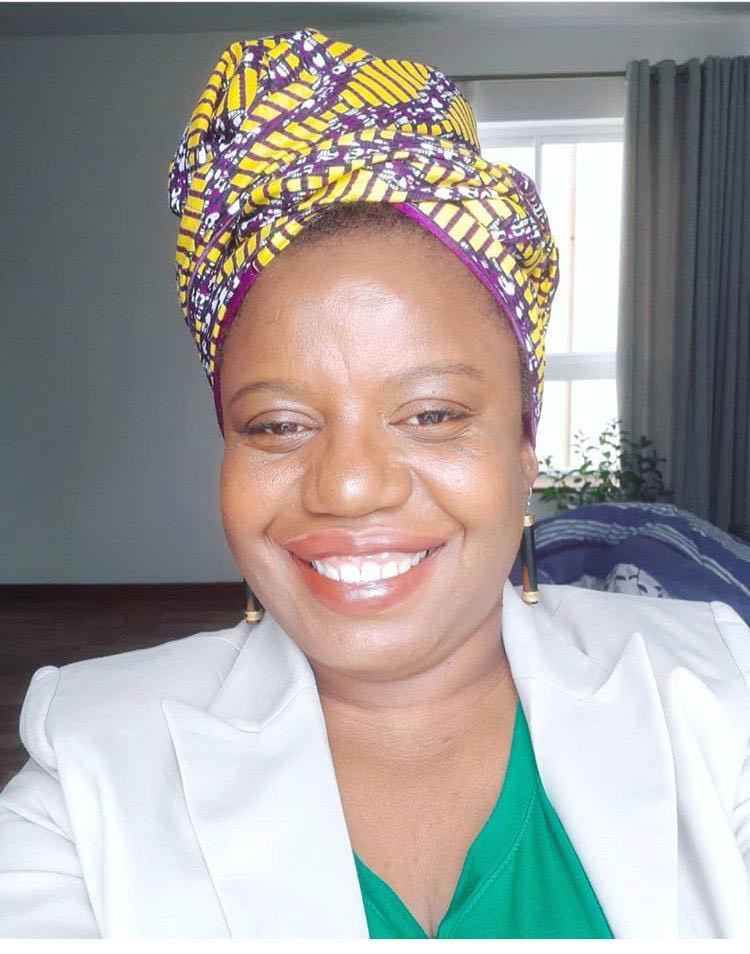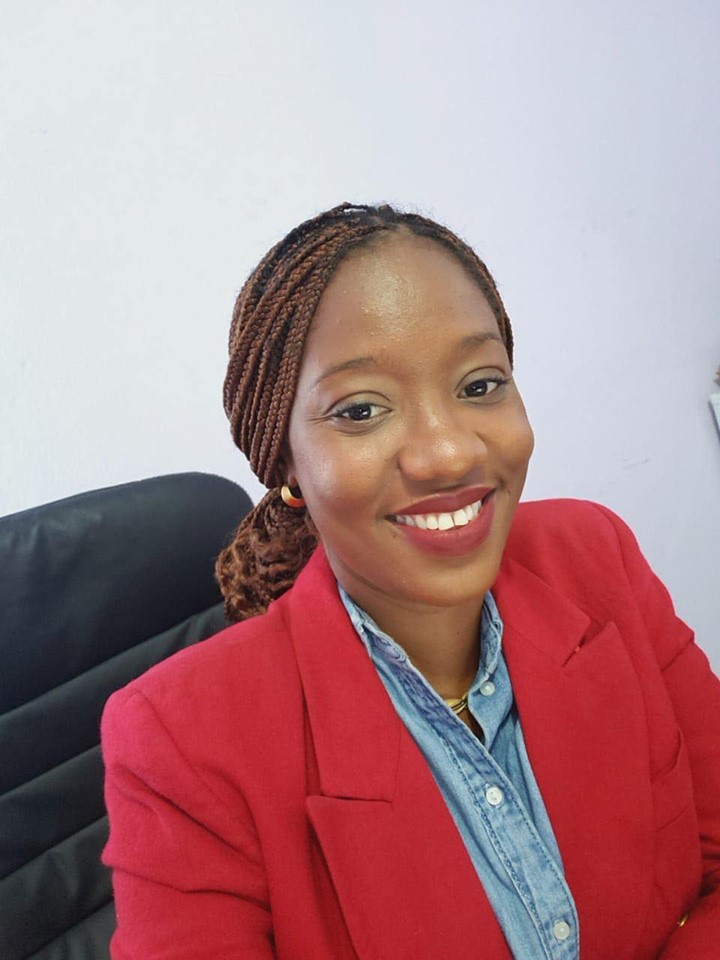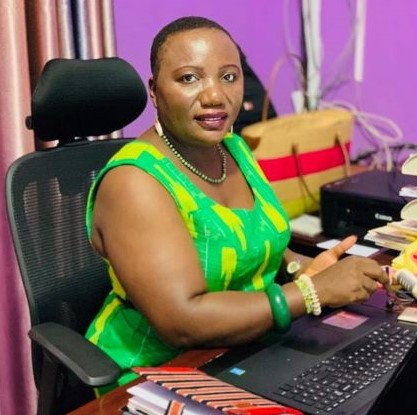-Prioritizing an Intersectional Feminist Approach to COVID-19
PHOTO: Carroline Bowah, one of the Authors
Authors:
Caroline Bowah, Feminist, Co-Founder, Liberia Feminist Forum

Korto Reeves, Feminist, Co-Founder, Liberia Feminist Forum

Lakshmi N. Moore, Feminist, Liberia Feminist Forum
We are at the turning point in the Liberian Government’s response to COVID-19 outbreak. The number of cases in Liberia has increased significantly over the last few days. There are 59 cases reported as of April 13, 2020 and climbing.
Since the announcement of the first case on March 16, 2020, there has been a steady spread across communities. Majority of the cases of COVID-19 reported are community transmissions, meaning they are not due to foreign travel. Some include health workers who attended to their patients, family members who interacted with an infected relative, and domestic workers attending to their responsibilities. Liberia is not alone in the spread as this is a similar trend in the region and globally.
However, Liberia bares a scar that reminds us that when outbreaks and crises do not slow down before they reach communities, the impact can be devastating. Liberians lived this reality most recently with the 2014 Ebola virus disease epidemic that hit the region and took over 4,000 lives. Stringent measures were announced on April 9, 2020 to help curb the spread including the declaration of a state of emergency and a lockdown (stay home mandate) for four counties, Montserrado, Margibi, Nimba and Grand Kru. However, those measures themselves are ineffective if the Government of Liberia does not apply an intersectional feminist analysis, which factors in socio-economic status, class, gender and geographic location, to its COVID-19 response. This approach is mandatory to center people at the risk of the outbreak and the very restrictions meant to protect them.
The new government came into power on a call for change that sought to shift development’s narrative towards the recognition of the thousands of Liberians experiencing poverty across rural and urban communities. A new national development plan, Pro–Poor Agenda for Prosperity and Development, launched in 2018, outlined the government’s plan “build a stable, resilient, and inclusive nation and lift an additional one million Liberians out of absolute poverty”. Over half of the 4.8 million people living in Liberia are experiencing poverty and intersecting forms of inequalities. Close to one third of Liberia’s population live in and around Monrovia, once again the epicenter of the virus outbreak. Many of them live in low-income communities where access to basic services are limited or non-existent – education, water and sanitation, energy, transportation, housing, and emergency preparedness (fire, flooding, etc.). These public services have decades long history of government’s neglect to invest in it and or were severely damaged during the civil war. Deep-rooted socio-economic and political hierarchies have normalized unequal power relations between different groups of people based on class, sex, education, geographic locations and other factors and limited realization of basic human rights. These power relations were instrumental in the cyclical shifts for power and access, from 1980s to the civil war, and the recent 2017 elections.
With COVID-19, Liberians face another unprecedented crisis. The lockdown has taken effect with a clear trajectory that puts many families deeper into the very socio-economic disparities they struggle with daily. Liberians must now contend with staying in homes where access to food is scarce or braving the lockdown to survive. Their choices could not be much more despairing. For many, the daily hustle brings in the money for the end of day meal, and sometimes the only meal for the day. For some, self-isolation is impossible when you share a home with more than 10 persons and frequent and close contact with the elderly. For others, clean water remains scarce for cooking and drinking, let alone washing hands, one of the key prevention measures for COVID-19. Many people also cannot afford the alternative – hand sanitizers. Access to public electricity is unpredictable. Homes and families have been lost to fire from the use of personal generators or and poor connection to public electricity lines. For others, limited access to electricity means you cannot store food beyond a day. Sanitation – access to latrine facilities also lacking. This is the reality of many Liberians. The lockdown will only exacerbate their conditions of poverty.
The lockdown mandates people to stay home and limit movement to an hour within their communities. Yet, for women and girls, a home is not always safe and secure. In addition to the increased burden of caregiving, it will become a space where sexual and other forms of gender-based violence is further normalized. It is where the family friend lurks to plan his sexual assault. It is where the father beats on the mother for not cooking food on time. It is where fiancés are murdered; partners are stabbed over allegations of affairs; and children have been abused and killed. Traditionally, long distance between communities and police stations, poor logistics for police officers, and high transportation costs hinder survivors from reporting cases of abuse, harassment and domestic violence.
Now under a lockdown, measures for movement are not clear if access to justice services are essential and if and how survivors of SGBV can report cases or access facilities within the time limits (i.e. one hour), including during curfew (after 3 PM). This also increases women and girls’ exposure to sexual violence and exploitation when law enforcers, under the enhanced power dynamics, violate women’s rights in communities. Furthermore, for women on contraceptives, a lockdown could mean making critical decisions related to their sexual and reproductive rights and health. For women and other persons living with HIV, the lockdown could mean lack of access to their medications or support groups and or being forced share or ration their medication with their partners.
Persons with disabilities already constrained by limited state services further marginalized (for examples, one-hour limitation for movement and access to transportation) during the lockdown. For queer communities, their survival, has, in most cases, been dependent on their invisibility and anonymity; and even in these instances where they are subjected to violence and hate. This situation is especially difficult within the context of religious fundamentalists defining the origin of the pandemic and promoting homophobic violence and myths.
Law enforcement officers have been deployed across communities to enforce the lockdown measures. A militarized enforcement focused response, however, fails to center people. As with Ebola, a militarized response aims to protect assets, property, “development”, “stability” and stop “people” from spreading the virus. Liberians’ relationship and history with law enforcement and the disproportionate use of force against citizens should caution the Government to assume people can simply be terrified into adherence. The Government must recognize people’s survival may supersede their obedience to regulations and mandates to stay home. There are reports of demolition of marketplaces under the directive of the Monrovia City Corporation; and acts of violence on citizens’ to enforce a curfew. These actions are not only counterintuitive to a Pro-Poor Agenda but also adversely impact the national response to COVID-19, especially in a time when Liberians will need to find reassurance, trust and not fear repercussions for their survival. These actions further undermine self-reporting and result in loss of income for people already struggling to feed themselves.
Government’s response to COVID-19 must therefore be feminist in centering people to prevent the spread and delivered in real time to mitigate harm and save people’s lives. This must include the analysis of varying and multiple factors that intersect and expose people to poverty in the first place and of unequal power dynamics reinforced during the lockdown. We therefore call on the Liberian Government to undertake the following actions to uphold its commitment to its own Pro-Poor Agenda for Prosperity and Development in a feminist way:
- Communications on Covid19 must be transparent and risk mitigating. Ensure that communications to the public is strategic, demystified, aligned to all literacy levels and provided in real time. The use of existing resources and platforms within local media (community radio stations), the state media entity and social media platforms is critical to coverage to all audiences. Women and other community leaders can translate the government’s life-saving advice into local languages to equip hard to reach communities with the information needed to protect themselves and stop the spread of the epidemic.
- Delivery of Home Survival Packages to High-need Communities. The need to align social protection strategies to the response cannot be overestimated. This action must be driven by key government institutions, including the Ministries of Labour, Gender, Agriculture & Finance and Development Planning. Many low-income communities are going to struggle to heed to lockdown because of hunger. Repurpose funding from capital expenditures and divert travel budgets to the provision of food and cash transfer programs. Many of the countries in the region have started this to incentivize communities to stay in by providing care cushions of rice, oil, canned goods, hand sanitizers (many communities are without water), hand soaps, etc. This action is lifesaving and promotes the public health prevention measures the government is demanding of Liberians.
- An Inclusive Economic Relief Package. This starts with timely payment of civil servants’ salaries; cancelling tax or tariffs on key items needed for response (i.e. masks, gloves, hand sanitizers); and preventing price hikes on food, pharmaceuticals and infection/prevention materials. It also includes engaging mobile service providers to reactivate promotions such as three-days free call; working with private sector on issues of rent freeze; and working with banks and credit facilities for economic recovery for small-medium enterprises. An engagement with the Liberian Business Association is long overdue in this light.
- Community Engagement is mandatory. Strengthen relationship with community leaders so that they can own their community prevention actions and work along with County authorities to support community led actions for self-isolation and quarantines. Communities are not silent recipients of prevention. Make them active contributors to plans.
- Recognition of Women Leadership must transcend superficial positioning seen over the last two years. Bring in more women and those working with communities that are highly vulnerable to the outbreak and measures, including persons living with disabilities and HIV/AIDs. This is at both county and national level. This means working with women groups that have the evidence and relationships with communities. There are many women organizations working in their communities and various socio-economic issues. Bring them to the tables. Listen to them, learn from them and support their outreach to their respective constituents
- Decriminalization of Poverty. This means clearly stopping any demolition exercise on people’s homes and livelihoods. In addition, ensure protocols are in place for protecting citizens against human rights abuses and clear reporting channels in place for accountability and redress.
- Ensure all law enforcement personnel have the requisite training in place to minimize use of force as their default response. This includes working with UN for basic human rights trainings and integration of sexual and gender-based violence (SGBV) support to them, anti-sexual exploitation and abuse. It is critical that law enforcement do not become the monster’s women and girls, and marginalized groups already fear in homes and communities. This action, in addition to other priorities, means that the Government of Liberia must embed SGBV prevention services into community engagement to support and uphold the safety and security of women in their homes. Therefore, bringing women organizations to the table is important but also to ensure when women and girls experience violations, they can safety access services and psychosocial support.
Over the next 14 days, many Liberians will be depending on their government to honor its commitment to inclusive development and lifting them out of poverty. Therefore, now more than ever before, Government’s Pro-Poor agenda needs to apply a feminist analysis to center people in its response to ending COVID-19 in Liberia. This ensures the ongoing lockdown does not exacerbate inequalities and conditions of poverty. Liberia’s overall approach must center the needs of people most vulnerable to the virus and lockdown measures and be gender responsive to effectively stop the spread of coronavirus outbreak and prevent hunger, criminalization, abuse,
Authors:
Caroline Bowah, Feminist, Co-Founder, Liberia Feminist Forum
Korto Reeves, Feminist, Co-Founder, Liberia Feminist Forum
Lakshmi N. Moore, Feminist, Liberia Feminist Forum

